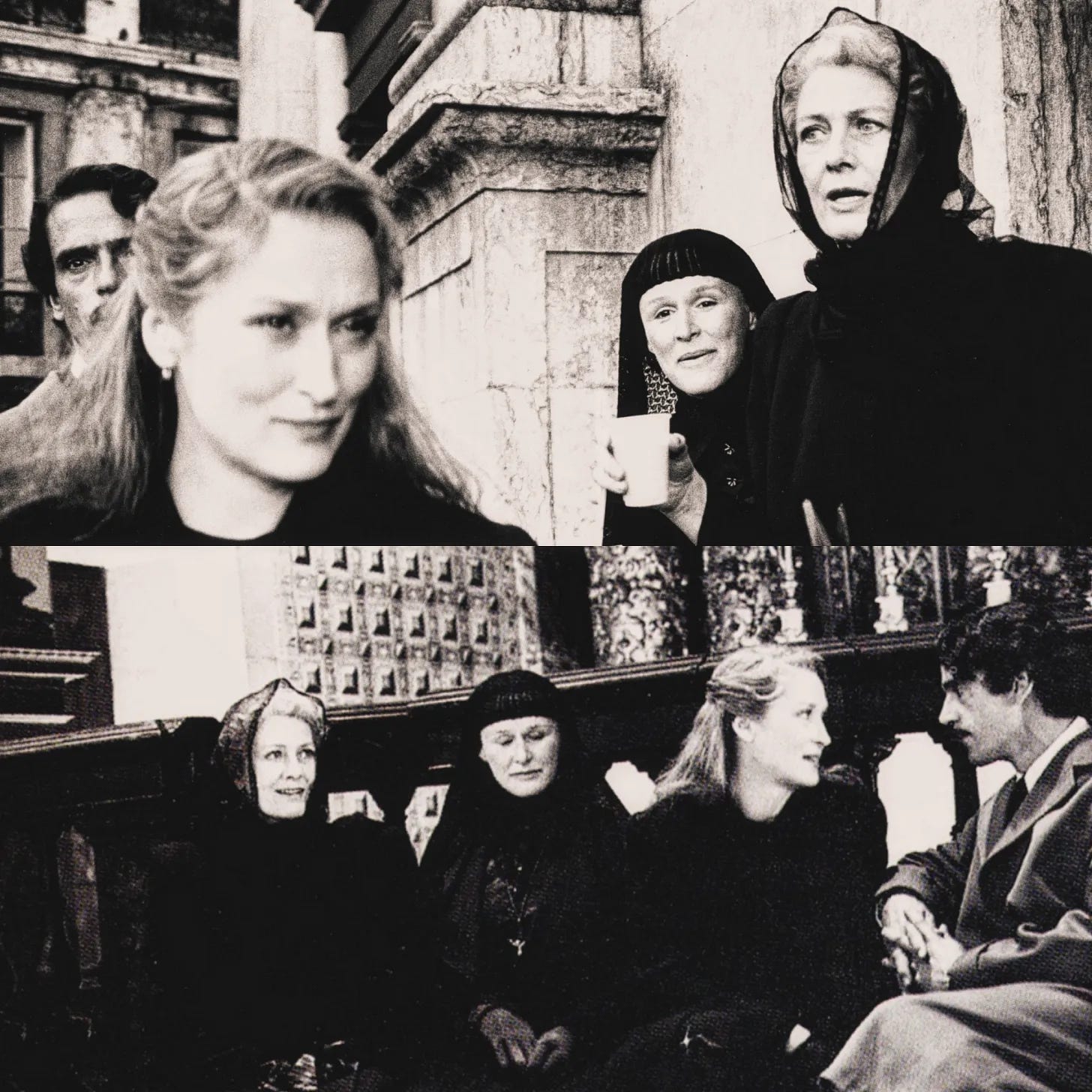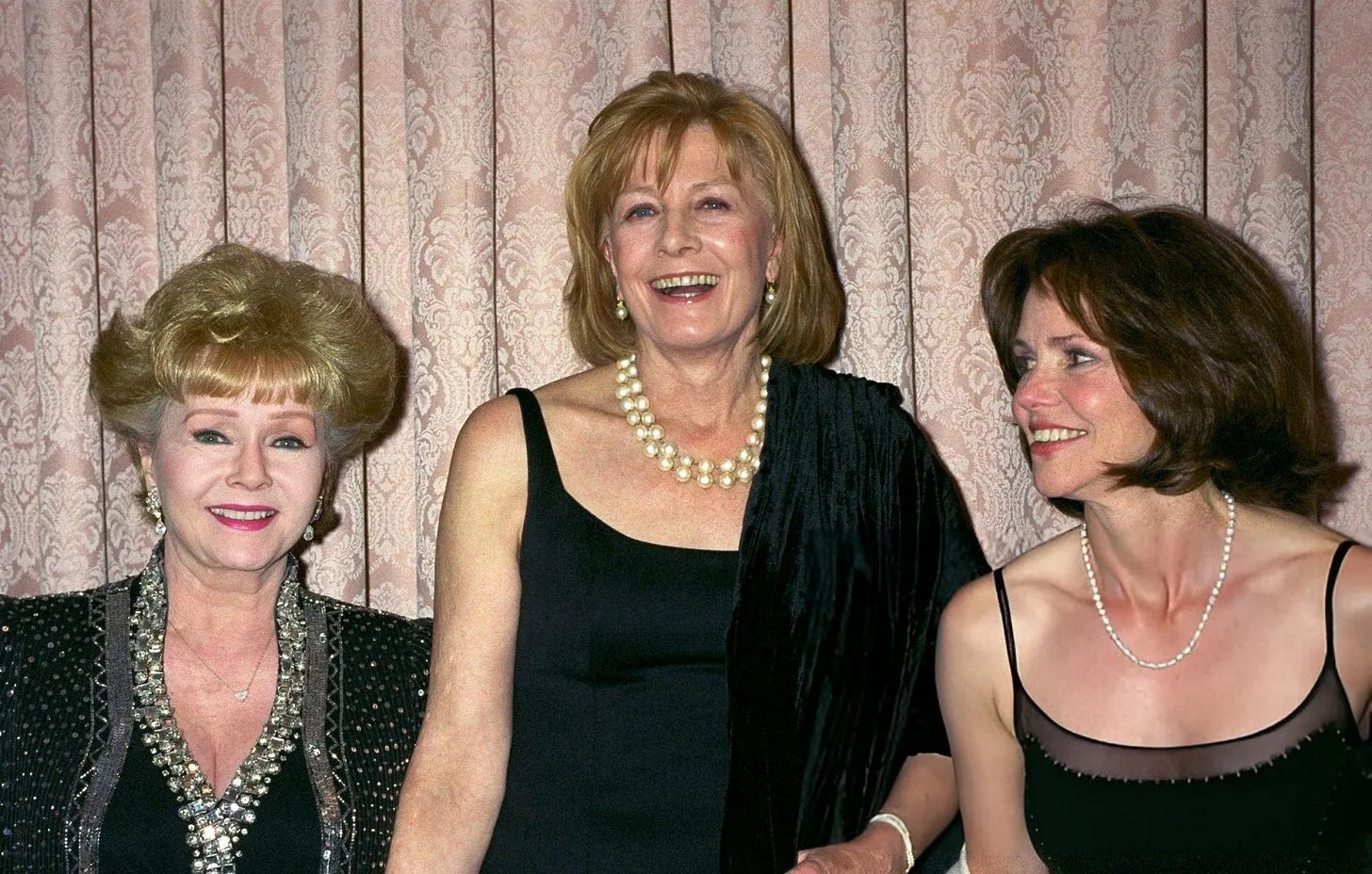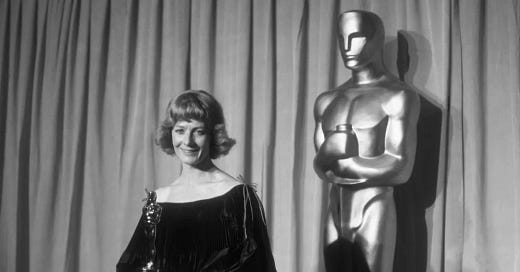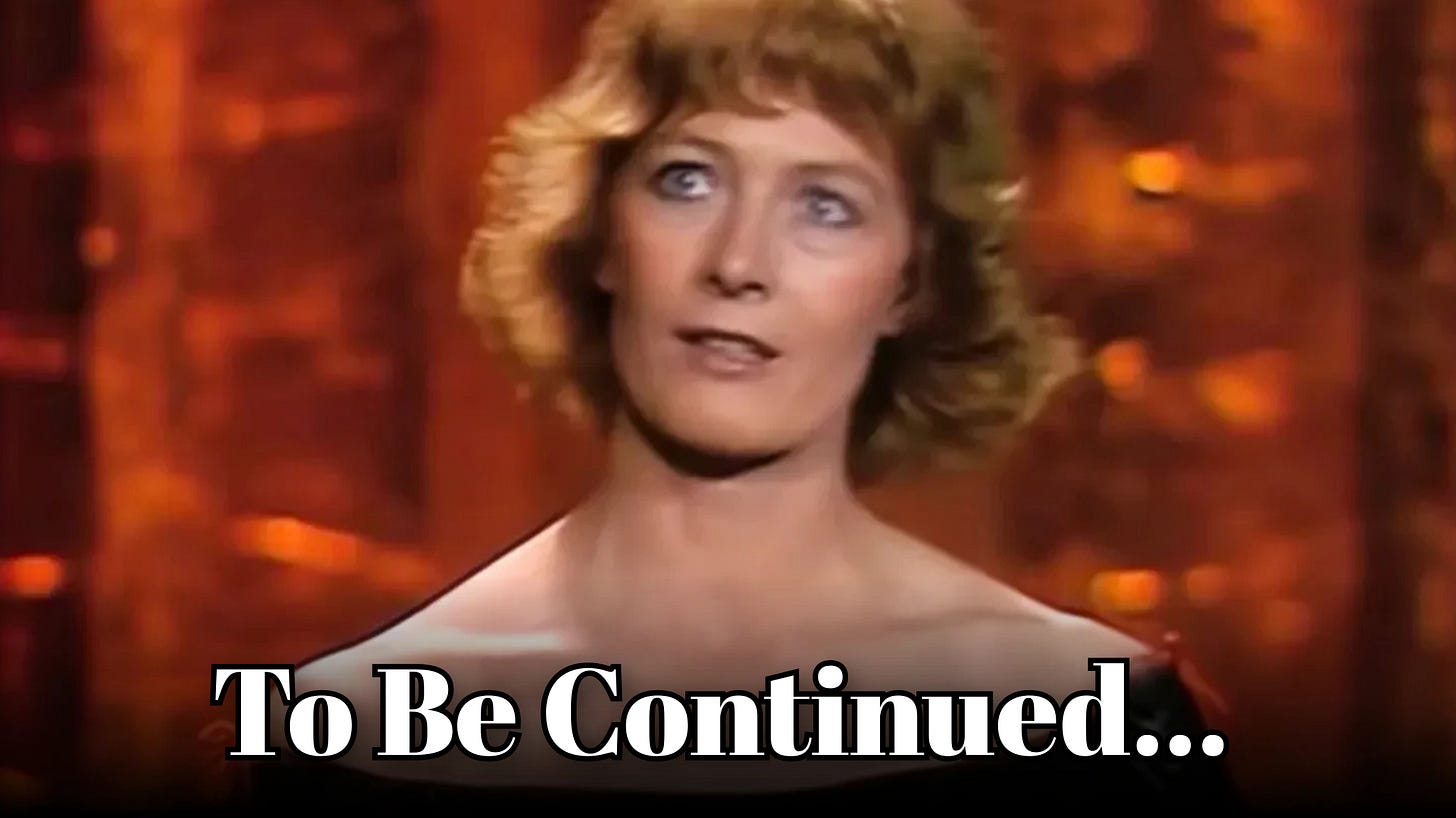Vanessa’s Varicose Veins (1977)
This week’s Substack kicks off a two-part dive into DAME VANESSA REDGRAVE whose towering craft and tireless activism often had disastrous consequences.
There’s death and there’s taxes and there’s Vanessa Redgrave.
I can’t recall a time in my life without VanRed in it! “Vanessa Yellowtomb”, as the other gay in my year christened her in the slightly more academic of the beastly borstals to which my parents condemned me. “If you wanted it Bad Enough, you’d do it despite the school(s),” was my mother’s great catchphrase, summoning up the cautionary tale of privately-educated Luas drivers – and the tax fraud or inheritance windfalls that (supposedly) bankrolled them. “It isn’t about the money, Mark,” she’d say. I’m not bitter. In any case, I’m proud to have attended the top-ranking academies in Dublin… In the recent child sexual abuse report.
“I’m sorry, could we stop for a moment?”
With those words, VanRed first penetrated my imagination. It was 2007. Atonement. Vanessa at her most Redgrave – although I didn’t realise it then. I sat in the UCI Blanchardstown transfixed!
It wasn’t somewhere we went very often, Blanchardstown. The Mother felt Blanch “had neither shape nor make to it” and, consequently, was undeserving of the motorway toll. A rare Sunday treat. She’d peruse the shopping centre, while I’d go to the pictures. Tout seul. As though Glennie No-Mates here had a posse o’ pals to drag along! Moreover, a kid who resembled a spinster librarian with a “roommate” called Dawn hadn’t the slightest issue getting into an adult-certified fil(u)m. I even remember which previews they showed. One was Evening. Entertainment Weekly’s Stinker of the Year only to I Now Pronounce You Chuck & Larry. (I assumed it was Norbit, but a quick Google search proves otherwise.) I don’t know if any of you have seen Evening – but the trailer is better than the movie. To the strains of Dido’s White Flag, these images flickered on screen in a near-empty cinema:
You can imagine how formative it was.
More brilliance awaited. Vanessa’s lone scene in Atonement. All five minutes and twenty-six seconds of it, per Matthew Stewart’s Screen Time Central.
Another septuagenarian would’ve suffered with this soppy soliloquy. VanRed roots it in reality. Upending the epilogue’s narrative function. She disarms you with her cadences; sidesteps the “big reveal”; and ekes out her character’s turmoil with fleeting, furtive glances. She’s Briony Tallis. A woman so emotionally stunted in childhood trauma that she still sports her little-girl pinafore and silvery-blonde bob. And yes, I appreciate that that’s a stylistic choice of the filmmakers. A visual motif to ensure audiences are cognisant of the character’s identity across three time spans. It wouldn’t do to subject Romola Garai or Inertia to the “Old Laura Brown” treatment. Julianne Less’s prosthetics at the end of The Hours were so famously intense that the production had to hire four cement masons. And a welder!
Vanessa portrays an elderly novelist who’s promoting her final book. The eponymous Atonement. In which she grants a happy ending to her sister Cecilia and Cecilia’s lover, Robbie – ameliorating the real-life devastation Tallis caused them in 1935. Now in her seventies, it’s the only recompense Briony can muster. She’s been diagnosed with vascular dementia. Having served a life sentence of guilty self-loathing for shattering their futures at thirteen.
À la Isabella Rossellini in Conclave, Vanessa is the film’s lynchpin. Although, unlike our IBS heroine, her artistry was overlooked in the year’s awards’ discourse. Indeed, in my post-Howards End lifetime, a seventh Oscar nomination has yet to materialise. But Redgrave doesn’t play “Briony – Aged 76” with self-congratulatory certitude and comforting closure. Not a chance!
At UCI Blanchardstown, Little Mark was wrecked by her hushed, lingering doubt.
“Vanessa Redgrave does it,” Our Number One Lady Glenn once said “Judi Dench does it.” Even educated fleas do– no.
Ms. Close wasn’t butchering Cole Porter lyrics but lamenting how British actresses, unlike their pigeonholed American sisters, glide effortlessly between stage and screen.
I can’t speak for Judi Dentures (or Maggie Smith or Eileen Atkins or any performer of Vanessa’s glenneration who hopscotched between the West End, Pinewood Studios and BBC Elstree due to the expedient of a centralised London hub), but Vanessa’s path is unique. Work your way through her eclectically bizarre list of post-1977 credits and you’ll soon realise that it’s less a deliberate career strategy; more an obligation to meet financial burdens. A polite way of saying: “What poor unfortunate needed bail, that month?”.
Nonetheless, the woman hailed by Arthur Miller and Tennessee Williams as the greatest actress of her age props up the worst dreck. A testament to the Olympian mastery with which she approaches her craft. (“Ah, so that’s where she lives!” daughter Joely Richardson cooed in 2011, echoing her late sister Natasha’s bittersweet belief that Vanessa flourished more in her personal fiefdom of politics and performing than in her everyday role as wife and mother.) Vanessa was born during a staging of Hamlet on January 30th 1937. Olivier was the Dane; her father, Sir Michael, his foil. “A great actress has been born this night,” Sir Laurence announced to the audience at the Old Vic. Or so theatrical lore goes. Laertes’s eldest was followed by son Corin in 1939 and another daughter, Lynn, in 1943.
She’s lived up to Larry’s prophecy e’er since.

In our post-empathy society, it bears repeating that caring about your fellow man is no crime. VanRed’s social conscience is doubly-qualified. Firstly, by a sometimes shocking naiveté. Secondly, by the background of wealth and influence that emboldens her.
Strictly speaking, she’s Dame VanRed now. I feel like a dog meowing every time I utter those words. (Imitating Jack Warner’s custom of calling her “that tall Communist broad” just rolls off the tongue.) After all, she rejected the damehood from a pre-Iraq Blair in 1999; but – feeling mortality, I ‘spose – accepted it from the dreaded Tory rump in 2022. In 1967, shortly after Life declared her “a late blooming sensation at the age of twenty-nine”, she was a precocious recipient of a CBE from Harold Wilson’s Labour government.

Half a century later, when she made her directorial debut aged eighty, she was as civically engaged as ever. Vanessa’s documentary Sea Sorrow (2017) concerns the plight of child refugees in the migrant crisis. An issue that tugs at atavistic heartstrings. During the Blitz, the Redgrave children keenly understood their privilege in comparison to other wartime evacuees. In nursery games, Vanessa would play the American President to Corin’s Prime Minister. Lynn, my favourite of the siblings and the closest thing the family produced to a “party person”, was the president’s dog.
“Corin and Vanessa now rail against [Clement] Attlee,” their mother, the actress Rachel Kempson, cheerily wrote to her husband in 1947. (Daddy was likely away on location. Or spending time with his Man Friday, Bob Mitchell, one of Vanessa, Corin and Lynn’s “uncles”. “Necessary degradations,” Sir Michael dubbed his homosexual liaisons. I urge you to do the same.) “They come out with streams of statistics,” Kempson continued about their Wunderkinder “and generally appear to know more than any of us!”. Vanessa and Corin’s instinct to put the world to rights from a patrician perspective would later have disastrous effects. Particularly when they fell in with the Workers Revolutionary Party.
“I choose all my roles very carefully,” Vanessa pontificated in 1997 “so that when my career is finished, I will have covered all our recent history of oppression.”
Good grief, if anybody else said that, I’m sure even Cynthia Erivo would look askance! With Redgrave, it’s both understandable and oddly endearing. Glenda Jackson, never one to be goaded to flattery, and a woman who had the good sense to go about her left-wing politics pragmatically, added a perfunctory “[Vanessa’s] work stands for itself”. The word “gravitas” was surely invented with VanRed in mind.
That burning passion, fiery like her performances, dovetails with her relentless activism. At the same time as Sea Sorrow, Vanessa joined striking junior doctors on their picket line. In 2014, library books for prisoners became her cause célèbre. Three years earlier, she showed up at Dale Farm in Essex where some five hundred Irish Travellers (that’s two whole families!) were facing eviction. She’s rallied with arts workers, environmentalists, a Guantanamo detainee, a Chechen separatist –
And perhaps most notoriously of all, the thrust of the next part of this article, The Palestinian.
For Part II, click here.
Read Next in My Supporting Actress Series:
Hattie McDaniel’s Legacy (1939)
The Case for IBS: Why Isabella Rossellini Should Win (2024)
See Also:
Edmund Burke’s Reflections on the (Revolution in France) Oscar Nominations, 1955







